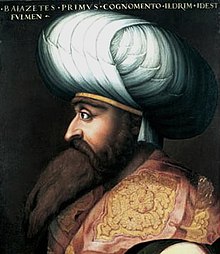Beyazıt I
| Bayezid I بايزيد اول |
|||||
|---|---|---|---|---|---|
| Ottoman Sultan | |||||

Bayezid I by Cristofano dell'Altissimo.
|
|||||
| 4th Ottoman Sultan | |||||
| Reign | 16 June 1389 ‒ 8 March 1403 | ||||
| Predecessor | Murad I | ||||
| Successor |
Interregnum (1402 – 1413) Mehmed I |
||||
| Born | c. 1354 | ||||
| Died | 8 March 1403 (aged 48-9) | ||||
| Burial | Bursa, Turkey | ||||
| Consorts |
Devlet Hatun Hafsa Hatun Despina Hatun Maria Hatun Sultan Hatun Two other wives |
||||
|
|||||
| Dynasty | House of Osman | ||||
| Father | Murad I | ||||
| Mother | Gülçiçek Hatun | ||||
| Tughra |  |
||||
| Full name | |
|---|---|
| Bayezid bin Murad |
Bayezid I (Ottoman Turkish: بايزيد اول; Turkish: 1. Beyazıt; nicknamed Yıldırım (Ottoman Turkish: یلدیرم), "The Thunderbolt"; 1360 – 8 March 1403) was the Ottoman Sultan from 1389 to 1402. He was the son of Murad I and Gülçiçek Hatun. He built one of the largest armies in the known world at the time and unsuccessfully besieged Constantinople. He was defeated and captured by Timur at the Battle of Ankara in 1402 and died in captivity in March 1403.
The first major role of Bayezid was as governor of Kütahya, a city that was conquered from the Germiyanids. He was an impetuous soldier, earning the nickname of Lightning in a battle against the Karamanids.
Bayezid ascended to the throne following the death of his father Murad I, who was killed by Serbian knight Miloš Obilić during (15 June), or immediately after (16 June), the Battle of Kosovo in 1389, by which Serbia became a vassal of the Ottoman Sultanate. Immediately after obtaining the throne, he had his younger brother strangled to avoid a plot. In 1390, Bayezid took as a wife Princess Olivera Despina, the daughter of Prince Lazar of Serbia, who also lost his life in Kosovo. Bayezid recognized Stefan Lazarević, the son of Lazar, as the new Serbian leader (later despot), with considerable autonomy.
The upper Serbia resisted the Ottomans until general Pashayigit captured the city of Skopje in 1391, converting the city to an important base of operations.
Meanwhile, the sultan began unifying Anatolia under his rule. Forcible expansion into Muslim territories could endanger the Ottoman relationship with the gazis, who were an important source of warriors for this ruling house on the European frontier. So Bayezid began the practice to first secure fatwas, or legal rulings from Islamic scholars, justifying their wars against these Muslim states. However he suspected the loyalty of his Muslim Turkoman followers, for Bayezid relied heavily on his Serbian and Byzantine vassal troops to perform these conquests.
...
Wikipedia
